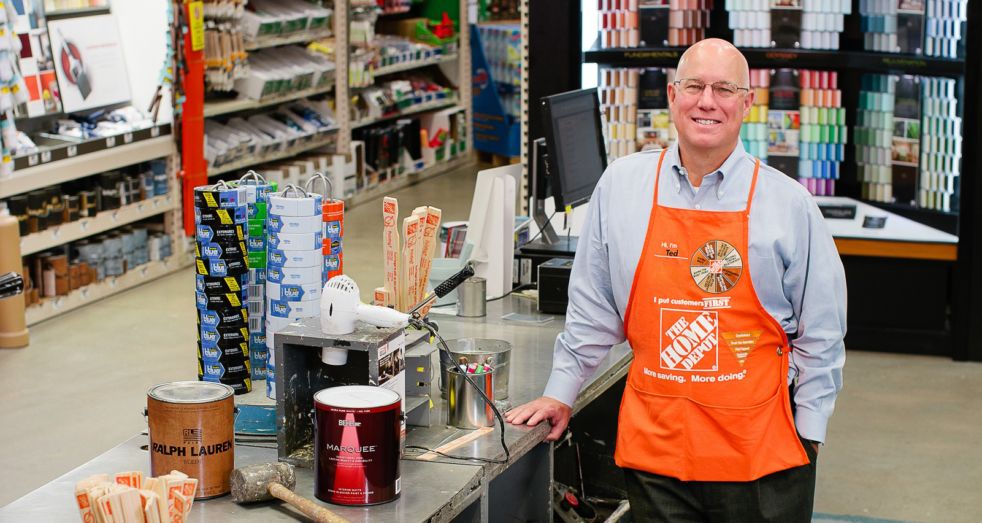On the evening of Feb. 10, Tech hosted the newly promoted Chief Executive Officer (CEO) of Home Depot, Ted Decker, at the Bill Moore Student Success Center in an event to teach students how to lead during difficult times. The event was hosted by the Guiding Organization Leadership Development (GOLD) Route, a program whose events and workshops center around professional and leadership development for students.
The event was at full capacity with 100 registered attendees along with members of Decker’s staff and school officials, including an appearance from President Àngel Cabrera.
The event opened with a networking opportunity for attendees to meet each other and Decker and enjoy snacks provided by Tech dining.
Then, Decker went on to be interviewed by Grace Mallon, third-year IE, covering such topics as how he started his career, his leadership style and how he navigated leading a multi-million dollar company through the COVID-19 pandemic as the former Chief Operating Officer (COO) of Home Depot, before his promotion. Decker will begin his duties as CEO on March 1.
Decker began working at Home Depot in 2000. He first occupied positions in strategic business development, finance and merchandising before being promoted to leadership positions in the company.
“In the early days, it was really about survival and putting our customers and associates first,” Decker said.
Home Depot made it through the pandemic with a $40 billion boost in sales. As people spent more time at home, the demand for home improvement increased. Decker considers Home Depot to be lucky to have survived the challenges set forth by the pandemic, especially compared to other industries, such as the travel industry, which faced far greater impact from the COVID-19 pandemic.
At the start of the pandemic, Home Depot’s initial concern was instituting safety precautions to minimize the spread of COVID-19 in stores, which included using social distancing signage and reducing store hours.
According to Decker, supporting the associates who operate Home Depot stores was vital to navigating the pandemic.
“They’re engaging with hundreds of people a day. And they’re showing up to work every day, putting themselves at risk,” Decker said.
In 2020, Home Depot offered their associates weekly bonuses to accommodate the extra risk being incurred and paid time off for when an associate or someone in their home was sick. In 2021, the weekly bonuses became a permanent wage increase.
Associates also found ways to navigate the difficult times themselves, often through offering gifts and food to their fellow employees.
“We’re so fortunate [that], in 42 years as a company, the culture is so strong. The culture takes care of it, and our associates take care of each other,” Decker said.
Decker went on to explain that outside of changes in business protocol and associate accommodations, the workers stepped up to take care of themselves and their communities in ways the corporate office did not expect.
“There’s nothing we could have done from the Store Support Center that could have had the power to impact 500,000 people if we hadn’t had the culture as strong as it was developed over 42 years,” Decker said.
Then, the interview turned to advice for Tech students about taking on leadership positions and navigating difficult situations from the position.
Decker discussed how building an effective team was vital to effective leadership. Quoting famed football player Peyton Manning, Decker said a leader must look for people with talent, the drive to work hard and a passion for what they do.
But, above all, an effective team member must have a sense of personal accountability.
Decker said this same approach is effective in advancing one’s career — professional skills, hard work, passion and personal accountability are all valuable characteristics to have.
“It’s someone who says ‘I’m accountable,’ who cares, who has pride in their work, who has pride in the work of the team,”
Decker said.
Decker described the work environment that students are entering today where working from home is increasingly common. He said the best method for dealing with isolation is empathy.
Working virtually has caused people to miss out on social interactions that contribute to the experience of work.
While it is necessary for the safety of workers and their community, Decker said he tries to empathize with the experiences people are losing and grieving for as a result of working from home.
“The only thing constant in life is change … Don’t just get used to it — embrace it because you will grow so much in periods of adversity,” Decker said.
Malin went on to discuss the student perspective, asking how students who are just entering the professional field can develop the skills necessary to be effective at their work.
Decker described good workers, and thereby good teams, as having a balance of expertise in a specific subject matter as well as the knowledge of a generalist. Generalists make good leaders, but it is most effective to begin one’s career developing specific expertise, then developing the generalist perspective and leadership capability later on.
Decker concluded the event by discussing the importance of personal development. He works to maintain social connections with his team members because building bonds within the company and the community can contribute to one’s happiness and make them an effective worker. That sense of community is the foundation of effectively navigating adversity as a team.
“Life is an endurance sport, and you’re going to have professional and personal adversity, and being resilient is just a huge piece of, ultimately, being happy,” Decker said.
